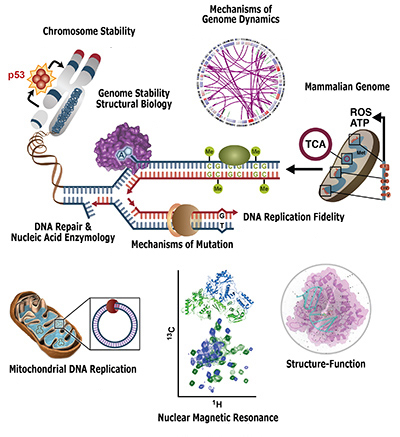-

-
Robert S. Williams, Ph.D.
Acting Chief, Genome Integrity and Structural Biology Laboratory and Principal Investigator -
Tel 984-287-3542
[email protected] -
P.O. Box 12233Mail Drop F3-03Durham, NC 27709
-

-
William C. Copeland, Ph.D.
Deputy Chief, Genome Integrity and Structural Biology Laboratory and Principal Investigator -
Tel 984-287-4269
[email protected] -
P.O. Box 12233Mail Drop E3-01Durham, NC 27709
Research Summary
The Genome Integrity and Structural Biology Laboratory investigates fundamental mechanisms of genetic stability and instability and provides insights into biological processes that modulate the effects of environmental exposures on human health. A major NIEHS focus is on long-delayed, environmentally-determined diseases initiated or enhanced by mutations. These conditions include both heritable birth defects and cancer, which together afflict millions of people each year in this country alone. One of the best points of attack is the mutation process itself, including gene mutations, larger chromosomal mutations, and genome mutations, such as losses or gains of entire chromosomes.

The Genome Integrity and Structural Biology Laboratory investigates the following topics:
- Fundamental mechanisms of mutation, including the induction of DNA damage, the repair of such damage, ways to avoid mutations while replicating past unrepaired damage, and ways that damage does cause mutations
- The generation of mutations by polymerase errors during DNA replication, even in the absence of damage
- Fundamental mechanisms of DNA and chromosome replication, especially in the context of mutagenesis
- Genomics, especially as it relates to mutagenesis and the impact of mutations on individuals and populations
- The relation between genetic variation in humans and their risks of disease following exposure to toxic agents
- The relationship between the atomic level structures of macromolecules and their biochemical properties
- The abilities of macromolecules to interact with substrates and other molecules, including those of environmental concern
- The functions of macromolecules in vivo


